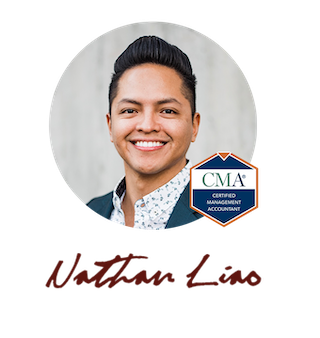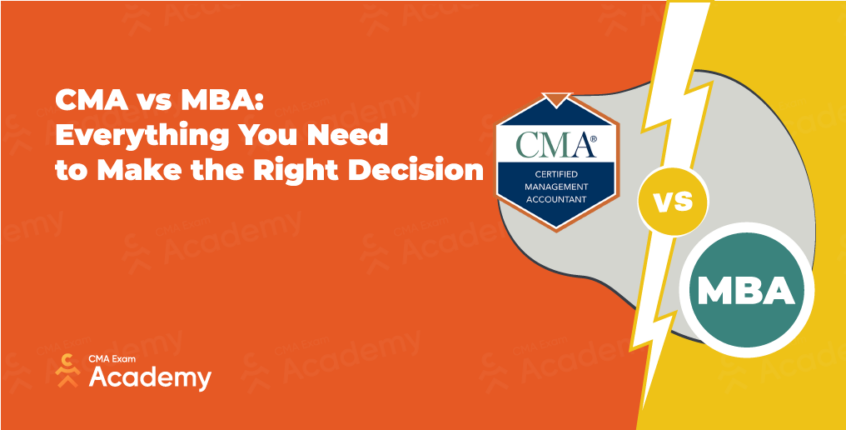If you’re an ambitious accounting professional and you want to begin the process of becoming a leader in your organization, the CMA and MBA are both excellent options. But which is better?
Both are great options for accounting professionals looking to grow in their careers, but there are quite a few significant differences between the two.
Here’s a brief overview of what sets these credentials apart:
- Cost commitment
- Time commitment
- Earning potential
- Eligibility requirements
- Career paths
In this article, I’ll explore some of these differences to help you determine which credential is right for you:
- What Is an MBA?
- What Is the CMA Certification?
- Time and Cost Commitment of the CMA and MBA
- Your Earning Potential as a CMA and MBA
- Eligibility Requirements of the CMA and MBA
- Career Paths for CMAs and MBAs
- CMA or MBA? How to Choose
Originally published in August 2020, this article was updated and republished on March 25th, 2024.
What Is an MBA?
First, let’s go over the basic definitions of these credentials.
An MBA is a Master of Business Administration. It is a graduate degree that must be obtained from an accredited university. For those looking to pursue a career in finance, many universities offer concentrations in accounting.
What Is the CMA Certification?
A CMA is a Certified Management Accountant. It is a professional certificate awarded by the Institute of Management Accountants (IMA). The CMA focuses on leadership in finance and accounting and demonstrates excellence in strategic planning, decision-making, and management.
Time and Cost Commitment of the CMA and MBA
This is perhaps the most significant difference between a CMA and an MBA.
Here’s an overview:
CMA | MBA | |
Average cost | $3,000 total | $60,000 per year |
Time investment | Between 8 months and 3 years | 2 years |
Completion rate | 50% | 60% |
Degree requirement | Bachelor’s | Bachelor’s |
Work experience | 2 years | 2 years |
The biggest difference between the two is the upfront cost investment. An MBA that takes two years to complete will cost approximately $120,000. The CMA, by contrast, costs only $3,000.
Another important difference is that experts have found that it takes an MBA roughly two years from the date of graduation to begin earning the average income in accounting and finance.
Compare that with the CMA. Although CMAs require two years of experience to earn their certificate, they are able to step into a higher-earning position as soon as they become certified.
Finally, the last two differences of note are completion rate and time investment. Although CMA candidates have up to three years to complete the CMA process, those who enroll in a high-quality CMA study course can complete the process in as little as eight months.
As far as the completion rate goes, my CMA review course nearly doubles students’ chances of success. While the global pass rate is only 50%, CMA Exam Academy students have an average pass rate of 92%!
So, if you’re considering earning a CMA, check it out. It’s guaranteed to help you pass the exam.
Your Earning Potential as a CMA and MBA
Although the upfront cost and time investment vary drastically, the earning potential of those with these certifications is quite similar.
MBA graduates with an accounting specialization have a high earning potential. The average salary of a CFO with an MBA is $400,000 per year, as of 2023.
This can vary significantly depending on where you went to school. Ivy League graduates can make more than that figure, but the investment required to earn the degree is also significantly higher.
CMAs also have high earning potential, with an average salary as a CFO of between $300,000 and $560,000. CMAs commonly earn pay increases, as they frequently establish themselves among the C-Suite of the company they work for.
With a smaller upfront investment, the ROI favors the CMA. But that doesn’t necessarily mean an MBA isn’t right for you. Think carefully about your decision and consider all the factors.
Eligibility Requirements of the CMA and MBA
The eligibility requirements for earning a CMA or MBA are quite different, but there are some common requirements.
To be admitted into an MBA program, you must first successfully complete an undergraduate degree in a relevant discipline. Depending on the program you are applying to, you may be required to demonstrate a high GPA.
To earn a CMA you must also have a related undergraduate degree, although some exceptions are made for those with professional accounting certificates and extensive work experience.
MBA programs are often competitive. They require candidates to apply with complete packages that include references.
The eligibility requirements for CMAs are also strict, although many professionals find them easier to manage. In addition to a four-year degree, CMA candidates must have two years of work experience. They must also pass the CMA exam.
Career Paths for CMAs and MBAs
Although the time and cost investment of these two credentials differ significantly, they can both result in similar career paths.
Common careers for MBAs who concentrate on accounting include:
- Investment banking
- Financial services
With some additional credentials, MBAs can also become Chief Financial Officers (CFOs).
As a CMA, you can hold leadership positions in a wide range of accounting and finance-related companies. Examples of CMA careers include:
CMAs are considered business leaders in financial management and management accounting fields.
CMA or MBA? How to Choose
Choosing between a CMA certification or an MBA is a highly personal choice. Your specific career goals and life situation determine the best option for you.
One factor to help you decide is the topics covered for each.
As a CMA exam taker, you’ll be tested on the following subjects:
- External Financial Reporting Decisions
- Planning, Budgeting, and Forecasting
- Performance Management
- Cost Management
- Internal Controls
- Technology and Analytics
- Financial Statement Analysis
- Corporate Finance
- Business Decision Analysis
- Enterprise Risk Management
- Capital Investment Decision
- Professional Ethics
MBA courses will cover the following topics:
- Financial Accounting Fundamentals
- Intro to Financial and Managerial Accounting
- Cost Management
- Financial Reporting and Business Analysis
- Financial Disclosures
- Climate and Financial Markets
- Leadership Communication
- Economics
- Organizational Behavior
- Data Analytics
- Financial Strategy
- Marketing Analytics
- Professional Ethics
CMA Topics | MBA Topics |
External Financial Reporting Decisions | Financial Accounting Fundamentals |
Planning, Budgeting, and Forecasting | Intro to Financial and Managerial Accounting |
Performance Management | Cost Management |
Cost Management | Financial Reporting and Business Analysis |
Internal Controls | Financial Disclosures |
Technology and Analytics | Climate and Financial Markets |
Financial Statement Analysis | Leadership Communication |
Corporate Finance | Economics |
Business Decision Analysis | Organizational Behavior |
Enterprise Risk Management | Data Analytics |
Capital Investment Decision | Marketing Analytics |
Professional Ethics | Professional Ethics |
If you want to work in different industries in accounting and finance leadership roles and earn your credentials while still working full-time, the CMA might be a good fit for you.
You may also want to consider the cost and time commitment into your decision.
Do you have the resources to spend two years and over $100,000 to earn an MBA? If so, and your career goals are a position that requires the degree, that might be the correct path for you.
It’s important to spend some time considering all your goals to fully understand the best choice for you.
Earn Your CMA in 16 Weeks
So, now that you know the difference between the CMA and MBA, it’s time to ask yourself: are you more inclined to pursue graduate studies or a certification that allows you to get to work right away?
Both the CMA and MBA are highly esteemed credentials in the world of finance and accounting that open doors for your career and professional life. But the CMA has a better ROI and allows you to step into a high-level position sooner than an MBA.
If you’re thinking of pursuing a CMA, consider investing in my 16-Week Accelerator Course. It has everything you need to pass the exam on your first try, and with a 92% pass rate on average, the results speak for themselves.

Hi, I’m Nathan Liao (aka the CMA Coach)! For the last 10 years, over 82,000 accounting and finance pros came knocking at my door seeking guidance and help. If you’re also aiming to conquer the CMA exam on your very first try—without wasting away time or money—you’ve found your ultimate guide. Dive in deeper to discover more about me and the dedicated team that powers CMA Exam Academy. Click here and let’s embark on this journey together!




5 Comments on “CMA vs MBA: Everything You Need to Make the Right Decision”
Which is best CMA (Indian) or (USA),or CAT ,iam very confused ,which is best at present and for future ,And which is tougher to clear the exam,how long it takes for both,is there any other course will be good out of these? And salary for both.
Hi Divya,
Thanks for your question! CMA USA is recognized globally and can open international career opportunities, while CMA India is more focused on the Indian market. CAT, on the other hand, is an entry-level qualification. If your goal is to build a global career in finance and management accounting, CMA USA is usually the better choice.
I offer courses for the CMA USA only. I offer a 16-week accelerator program per part that helps you earn your CMA within a year. For all the details please visit https://cmaexamacademy.com/product/premium-cma-coaching-combo-part-1-part-2/
For more detailed guidance, I’d suggest you explore online forums, and the official IMA site
Regarding salaries, I invite you to check the following article: CMA Global Salary vs Non-CMA Compensation
Hello,
As a post graduate of MSc major in Finance & Accounting, Am I able to obtain CMA without any exams.
Currently working as a Management Accountant over 5 years.
Thanks
Everyone has to take the exams.
I am not sure where you are getting your information, but good topic. I needs to spend some time learning much more or understanding more. Thanks for great info I was looking for this information for my mission.